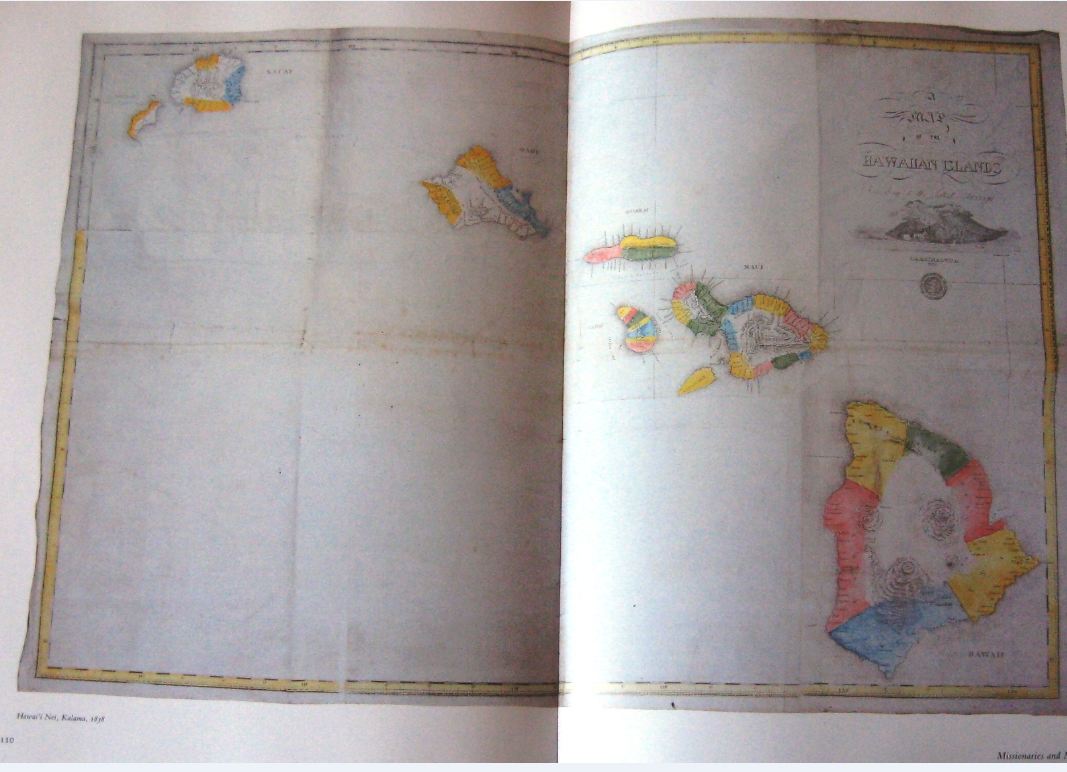Seller Beware: Who really owns it?
- by Susan Halas

A rare 1838 map of the islands from a little New England library, did it still belong to them?
Here We Go Again
Incident #2 came up less than a year later in the spring of 2012.
A good client on Oahu called me to say some missionary era Hawaiiana had come to market in Honolulu. Among the items offered for sale was an exceedingly rare 1838 map from the press at Lahainaluna. The map and the other pieces in the collection had once belonged to an early New England missionary to the islands.
My client gave me the name of the seller’s agent, who was not a professional in the antiquarian field and seemed like an unlikely choice to represent such early, rare and unusual items.
In addition to the delicious map the collection included one of the earliest Bibles printed in the Hawaiian language and a number of native artifacts. They were individually priced. We're talking six figures or more for the lot.
I contacted the agent and immediately I thought something was fishy and let it drop. A few weeks passed and I got a call back, was I still interested? Well, I thought, let’s at least have a look.
Within a few days I received a price list, many photos of the items and copies of documents. The documents did indeed verify that these items once belonged to an early missionary to Hawaii and were gifted at the beginning of the 20th century to a small town library in New England.
What is missing is the information on how they got from the library to hands of a private party. After I’d asked the seller’s agent several times for a bill of sale, gift letter or receipt and didn’t get any response, I called the library.
I spoke with the librarian who said she had worked there since 1981and did not know anything about the transaction. She was fairly abrupt with me and our conversation only lasted a few minutes. I left my name, number and email address.
A few hours later she emailed back and said that she had spoken with someone who had worked at the library before her time and that these items were once part of their collection, but she did not provide any details of how they came to be de-accessioned.
Then in the course of several more calls the story started to change: First the librarian didn’t have any recollection of this collection. Next she dug into it further and discovered that they once did own it.
Then it turned out some 30 or 40 years ago they “gave” all that old stuff away without so much as a receipt to someone close to the library to "make space."
The recipient of the items is a person they know well. The recipient is “a good person” who lives in their town and has kept these materials safely for all the intervening years. The recipient located a representative in Hawaii and put them up for sale.
The library, having discovered from my phone call that the old stuff that they gave away long ago was on the market and is said to be worth big bucks, convened an emergency meeting of the library trustees. They got a lawyer and the trustees decided, lo these many years later, that it’s their stuff and they want it back.
“We intend to recover our property,” the librarian told me.
Then came a variety of ex post facto rationales to justify their actions including their “fiduciary responsibility to the heirs of the original donors” and that the person who gave it away “did not have the authority to do so,”....well just use your imagination.
Then it was old junk, just taking up space. Now it’s a priceless treasure, and in their eyes it’s still their property.
Who is right? Who is the real owner of this material?
Ask Our AE Expert
My next call was to our own in-house expert, AE publisher Bruce McKinney, who is often asked to mediate in cases of this sort.
According to McKinney, “These kinds of situations are a lot more common than you might think.”
Often, he said, they involve goods that were stolen or misappropriated, but sometimes they also are about situations where something was thrown out, dumped in the trash, given away or changed hands with few or no records to substantiate the transfer.
Time passes, values increase and when the goods finally come to market there's an argument -- and even a battle in court -- about who is the rightful owner.
What these cases have in common is the causal agent is frequently some long ago librarian or keeper of the public files who thought they'd just clean out the junk that nobody used or wanted anymore.